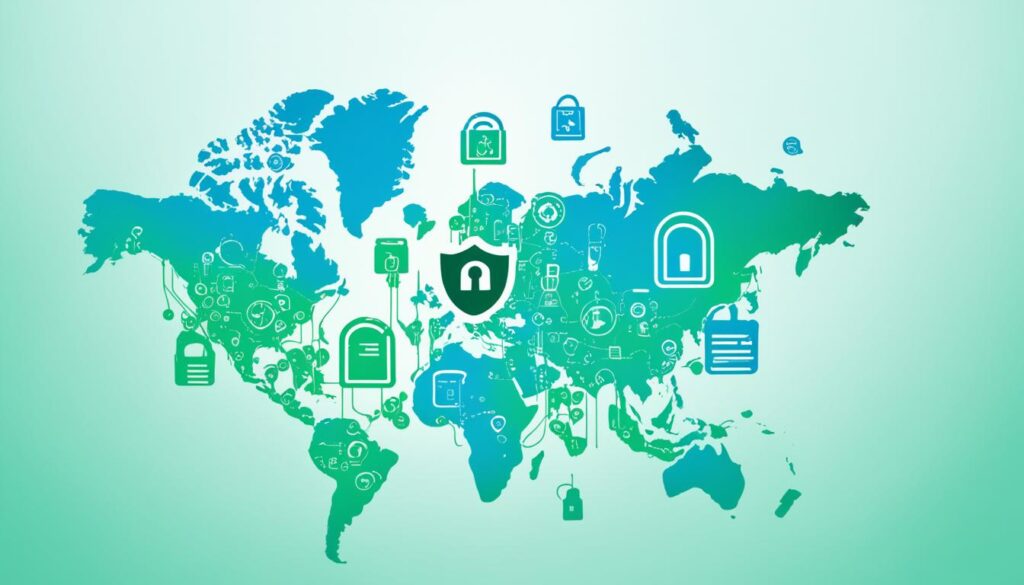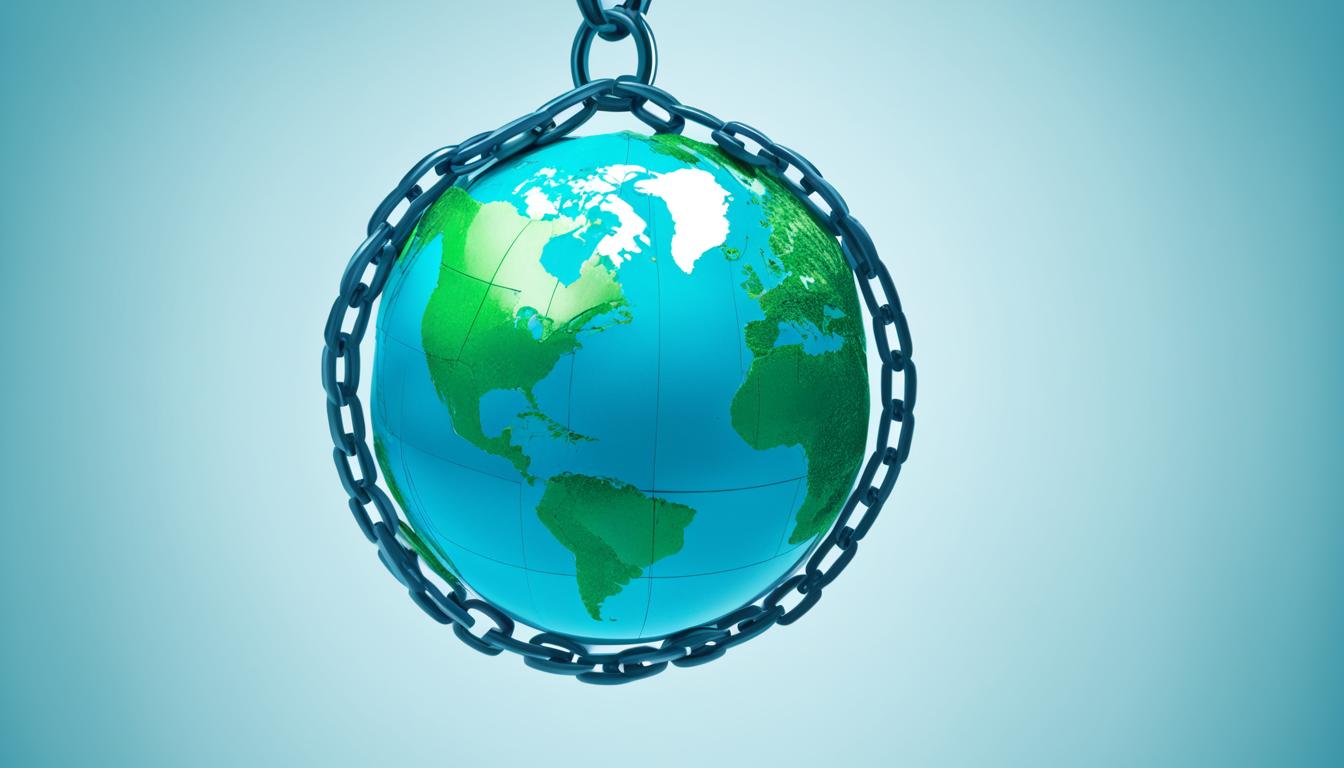Are we unknowingly putting our company’s reputation at risk by mishandling international data transfers? In today’s globalized business landscape, navigating the complex web of data privacy compliance and cross-border data flows has become a critical challenge for organizations worldwide.
The General Data Protection Regulation (GDPR) and California Consumer Privacy Act (CCPA) have changed how we handle personal information. Companies face steep financial penalties, with fines reaching up to 4% of their annual global turnover for GDPR violations1. Beyond monetary consequences, the reputational damage can be severe, as 87% of consumers would switch to a competitor if they believed their data was being managed irresponsibly1.
We’re seeing a shift towards more stringent data protection measures globally. As of February 2024, 14 U.S. states have implemented their own privacy laws, showing a trend towards state-specific regulations2. This patchwork of laws, combined with international regulations like the EU’s GDPR, China’s Personal Information Protection Law, and Canada’s PIPEDA, creates a complex landscape for businesses operating across borders2.
To safeguard reputation and ensure compliance, organizations must prioritize robust data security measures. By doing so, they can reduce the risk of data breaches by 80% and decrease financial losses from such incidents by 95%1. Moreover, companies that embrace data compliance practices enjoy a 22% boost in competitive advantage and a 25% increase in consumer trust1.
Key Takeaways
- GDPR and CCPA are reshaping global data privacy standards
- Non-compliance can result in severe financial and reputational damage
- Implementing strong data security measures significantly reduces breach risks
- Data compliance enhances competitive advantage and consumer trust
- Understanding diverse international regulations is crucial for cross-border operations
- Privacy-enhancing technologies support secure international data transfers
Introduction to Data Privacy Compliance
Data privacy compliance is key in today’s business world. It means following laws that protect personal info and letting people control their data. Companies must find a balance between needing data and respecting privacy to gain trust and keep a good name34.
The GDPR and CCPA are big laws that changed how businesses use personal data. They give people more control over their info and set strict rules for companies54.
- Avoiding hefty fines and penalties
- Fostering trust with customers
- Enhancing operational efficiency
- Protecting against data breaches
To follow these laws, companies need strong cybersecurity, clear data use info, and respect for user choices. This means working with data protection authorities to make sure privacy is done right4.
“Data privacy is not just about compliance; it’s about building trust and respecting our customers’ rights.”
But, making sure data privacy is followed is hard. Companies face complex rules, new tech needs, and training staff on data handling. These issues need constant work and resources to solve4.
| Regulation | Key Requirements | Potential Penalties |
|---|---|---|
| GDPR | Lawful data processing, breach notification | Up to €20 million or 4% of global revenue |
| CCPA | Consumer rights fulfillment, opt-out options | $2,500-$7,500 per violation |
Overview of Major International Data Transfer Regulations
Data protection laws are now a global issue. Countries all over the world have made rules to keep personal information safe. Laws like GDPR and CCPA shape how data moves across borders. They help protect privacy while allowing data to flow between countries.
The GDPR started on May 25, 2018, and changed how businesses handle data from European citizens6. It makes all European Economic Area (EEA) countries and some others follow strict data protection rules6. The CCPA, on the other hand, focuses on keeping personal info safe in California.
Other countries have made their own laws too. China brought in the Personal Information Protection Law (PIPL) on November 1, 2021. Saudi Arabia started its privacy law on September 14, 20236. These laws show a worldwide push for better data protection.

The European Commission has given special approval to some countries for data transfers. This includes the UK, Japan, New Zealand, Uruguay, and Switzerland7. The EU-US Data Privacy Framework and the UK-US ‘Data Bridge’ from July and October 2023, respectively, make it easier to send personal data between these areas7.
Even with these steps forward, there are still hurdles. Doing Transfer Risk Assessments and understanding Binding Corporate Rules is hard. Businesses need to keep up with new rules to stay in line and keep customers’ trust.
| Region | Countries with Data Protection Laws | Percentage |
|---|---|---|
| Global | 137 out of 194 | 71% |
| Africa | – | 61% |
| Asia | – | 57% |
| Least Developed Countries | – | 48% |
This table shows how many countries have data protection laws, with big differences in each region8. It points out the need for more work to make sure all countries have strong data protection rules, especially in poorer ones.
General Data Protection Regulation (GDPR) and International Data Transfers
The GDPR sets strict rules for EU data protection. It affects businesses worldwide, especially those in the EU or handling EU residents’ data. The law has seven core principles: lawfulness, fairness, transparency, purpose limitation, data minimization, accuracy, storage limitation, integrity and confidentiality, and accountability.
Companies need a valid reason for processing data and must respect data subject rights. The European Commission can decide if a country outside the EEA has the same data protection as the EU9. Countries with good data protection include Andorra, Argentina, Canada, Faroe Islands, Guernsey, Israel, Isle of Man, Jersey, New Zealand, Switzerland, Uruguay, Japan, the United Kingdom, and South Korea10.
For data transfers to countries without EU approval, companies can use special agreements or rules910. The Schrems II ruling said sometimes more steps are needed to protect data9.

The UK GDPR covers UK controllers and processors, with some exceptions. It aims to protect people’s rights when their data goes outside the UK11. Sending personal data out of the UK is a restricted transfer and must follow UK GDPR rules11.
Not following GDPR can lead to fines up to 4% of global revenue or €20 million. To stay compliant, companies need to keep up with the latest rules from data protection authorities.
| GDPR Principle | Description |
|---|---|
| Lawfulness, Fairness, and Transparency | Process data legally, fairly, and with clear communication to data subjects |
| Purpose Limitation | Collect data for specified, explicit, and legitimate purposes |
| Data Minimization | Limit data collection to what’s necessary for the purpose |
| Accuracy | Ensure data is accurate and up-to-date |
| Storage Limitation | Keep data only as long as necessary for the purpose |
| Integrity and Confidentiality | Process data securely, protecting against unauthorized access |
| Accountability | Demonstrate compliance with all GDPR principles |
California Consumer Privacy Act (CCPA) and Cross-Border Data Flows
The California Consumer Privacy Act (CCPA) started in 2018 and took effect in 2020. It changed how data privacy works in the U.S12.. This law gives people more control over their personal info, like asking for their data or deleting it12.
The CCPA doesn’t directly manage data moving across borders. But, it works with laws like China’s Personal Information Protection Law (PIPL) and the EU’s General Data Protection Regulation (GDPR) on these issues13. Companies dealing with these laws can use CCPA rules to follow international standards.

CCPA rules apply not just in California but worldwide. Companies working globally must follow a mix of data protection laws. For example, 14 U.S. states have their own privacy laws, with California’s being the most detailed14. This mix of laws makes it hard to protect data and respect consumer rights.
Following CCPA rules is key for businesses. Not following them can lead to fines up to $7,500 per issue12.
The California Privacy Rights Act (CPRA) makes consumer protection even stronger. It brings in new ideas like data minimization and gives more power to enforce laws. Companies now must check risks in data handling and set clear rules for working with third parties.
| Regulation | Key Features | Maximum Fine |
|---|---|---|
| CCPA/CPRA | Consumer rights, data minimization | $7,500 per violation |
| GDPR | Data protection officer requirement | €20 million or 4% of global turnover |
As people learn more about privacy, companies are under more pressure to protect personal info. Not following data laws can hurt a company’s reputation, make customers lose trust, and lead to fewer sales12. In today’s world, following CCPA rules is not just a legal must. It’s key to keeping customer trust and business success.
International Data Transfer Regulations: Key Compliance Measures
Understanding international data transfer rules is key. We’ll look at important steps to stay compliant.

Binding corporate rules (BCRs) are rules for companies moving data across borders. They need approval and must cover why data is moved, what kind of data, and how it’s kept safe15.
Standard contractual clauses (SCCs) are pre-approved for moving data. They’re easy for businesses to use. But, you must check the country’s data protection laws and add extra safety if needed.
Decisions by groups like the EU Commission make it easier to move data to certain countries. Countries like Argentina, Canada, and Switzerland are okay15.
Not following the rules can lead to big fines. For example, GDPR fines can be up to €20 million or 4% of your yearly sales16. In the US, 14 states have their own privacy laws, making it harder to follow the rules17.
“Compliance with international data transfer regulations is not just about avoiding fines; it’s about building trust with your customers and protecting their data.”
By using these steps, we can move data legally and safely. This keeps our reputation strong and protects personal info.
Challenges in Complying with International Data Transfer Regulations
Managing data across borders is tough for firms that handle reputations. The rules for moving data internationally have grown, with 62 countries now having them, up from 35 in 201718.
Dealing with data across borders is harder, especially with third-party vendors. The world needs fast and easy data sharing for innovation in many areas19. But, we must follow different laws for protecting data in places like the EU, China, and the U.S19..
Now, there are more than twice as many rules for handling data locally, from 67 in 2017 to 144 in 2021, with more being planned18. This makes it tough for firms that work in many countries. They have to follow a lot of rules to stay legal.
| Country | Number of Data Localization Requirements |
|---|---|
| China | 29 |
| India | 12 |
| Russia | 9 |
| Turkey | 7 |
These rules often focus on certain data like personal info, health records, and financial details. For U.S. companies, following the rules is harder when dealing with EU citizens’ data. They must follow GDPR when working in the EU or handling personal data20.
To beat these hurdles, firms need strong data protection steps, detailed risk checks, and clear agreements with partners to stay legal across borders20.
Best Practices for Ensuring Compliance in Reputation Management
Having strong data protection policies is crucial for staying compliant in managing reputations. Regular checks and assessments of data help spot risks and weak spots21.
It’s vital to have a skilled data protection officer. This person makes sure privacy rules are followed and deals with laws like GDPR and CCPA21.
Training employees on data privacy is key. It teaches them how to handle sensitive info safely and lowers the chance of data leaks22.
Having a solid consent management system is a must. It helps us get and keep track of users’ okay for collecting and using their data, following the law23.
“Compliance is not a one-time effort but an ongoing commitment to protecting user data and maintaining trust.”
Choosing reliable, compliant partners is crucial. We make sure our partners respect data laws and are open about how they handle data2221.
| Compliance Practice | Benefit |
|---|---|
| Regular Data Audits | Identify and address vulnerabilities |
| Employee Training | Reduce risk of data breaches |
| Consent Management | Ensure legal data collection |
| Compliant Vendors | Maintain data protection standards |
By following these steps, we can safeguard user data, earn trust, and stick to global rules for data transfer.
Conclusion
International data transfer rules are key for managing reputations and keeping data private. The GDPR leads the way in protecting data, focusing on being clear, responsible, and respecting people’s rights24. Laws like the GDPR and CCPA guide how companies use personal info worldwide.
It’s important to keep up with global data protection laws to stay compliant24. Companies face many rules, like using Standard Contractual Clauses (SCCs) and Binding Corporate Rules (BCRs) for moving data safely24. New laws like the Data Governance Act and Data Act make it harder to move non-personal data25.
For good reputation management, companies must focus on protecting data. This means using strong encryption, doing Data Transfer Impact Assessments, and working with others in the industry24. By doing these things, companies can gain trust, avoid fines, and keep a good name in our digital world. Remember, following data transfer rules is not just about obeying laws. It’s about valuing privacy and building trust online.
FAQ
What is data privacy compliance, and why is it important?
What are the major international data transfer regulations organizations need to comply with?
What are the key requirements of the GDPR for international data transfers?
What are the main requirements of the CCPA for cross-border data flows?
What are some approved transfer mechanisms for international data transfers?
What are some challenges in complying with international data transfer regulations?
What are some best practices for ensuring compliance in reputation management?
Source Links
- What Is Data Compliance? Top Regulations You Need to Know – https://www.digitalguardian.com/blog/what-data-compliance-top-regulations-you-need-know
- Cross Border Data Transfer: Global Data Compliance Strategies – https://www.linkedin.com/pulse/cross-border-data-transfer-global-compliance-strategies-xxhvf
- What Is Data Privacy Compliance and How Can You Achieve It? – https://www.osano.com/articles/data-privacy-compliance
- What Is Data Privacy Compliance? – https://www.paloaltonetworks.com/cyberpedia/data-privacy-compliance
- Data protection and privacy laws – https://id4d.worldbank.org/guide/data-protection-and-privacy-laws
- Avoid Cross-Border Data Transfer Nightmares: The 2024 Guide to Success | Anonos – https://www.anonos.com/blog/cross-border-data-transfer
- International Data Transfers Guide | Data Protection Network – https://dpnetwork.org.uk/international-data-transfers-guide/
- Data Protection and Privacy Legislation Worldwide – https://unctad.org/page/data-protection-and-privacy-legislation-worldwide
- International data transfers | European Data Protection Board – https://www.edpb.europa.eu/sme-data-protection-guide/international-data-transfers_en
- Third Countries – General Data Protection Regulation (GDPR) – https://gdpr-info.eu/issues/third-countries/
- A guide to international transfers – https://ico.org.uk/for-organisations/uk-gdpr-guidance-and-resources/international-transfers/international-transfers-a-guide/
- The California Consumer Privacy Act (CCPA): A Model for International Data Privacy? – Michael Edwards | Commercial Corporate Solicitor – https://michaeledwards.uk/the-california-consumer-privacy-act-ccpa-a-model-for-international-data-privacy
- Cross-Border Data Transfers: PIPL vs. GDPR vs. CCPA – https://cdp.cooley.com/cross-border-data-transfers-pipl-vs-gdpr-vs-ccpa
- Cross Border Data Transfer: Global Data Compliance Strategies – https://dualitytech.com/blog/cross-border-data-transfer
- Chapter 13: Cross-Border Data Transfers – Unlocking the EU General Data Protection Regulation | White & Case LLP – https://www.whitecase.com/insight-our-thinking/chapter-13-cross-border-data-transfers-unlocking-eu-general-data-protection
- Data Compliance for Regulations Around the World – https://bluexp.netapp.com/blog/data-compliance-regulations-hipaa-gdpr-and-pci-dss
- Cross Border Data Transfer: Global Data Compliance Strategies – https://dualitytech.com/blog/cross-border-data-transfer/
- How Barriers to Cross-Border Data Flows Are Spreading Globally, What They Cost, and How to Address Them – https://itif.org/publications/2021/07/19/how-barriers-cross-border-data-flows-are-spreading-globally-what-they-cost/
- Guide to the cross-border transfer of personal data for global companies – https://incountry.com/blog/guide-to-the-cross-border-transfer-of-personal-data-for-global-companies/
- What you should know about cross-border data transfer laws – https://www.kmworld.com/Articles/Editorial/ViewPoints/What-you-should-know-about-cross-border-data-transfer-laws-161990.aspx
- Data Privacy Compliance 101: Key Regulations and Requirements – https://www.zendata.dev/post/data-privacy-compliance-101-key-regulations-and-requirements
- Data Privacy Compliance: Best Practices for Global Teams – https://www.deel.com/blog/data-privacy-compliance-best-practices-for-global-teams
- Reputation Data Processing Addendum – Reputation – https://reputation.com/reputation-data-processing-addendum/
- International Data Transfers: Understanding Legal Frameworks | Mandatly – https://mandatly.com/gdpr-compliance/international-data-transfers-understanding-legal-frameworks
- EU Regulatory Data Protection: International data transfer rules for non-personal data | DLA Piper – https://www.dlapiper.com/en/insights/publications/2023/06/eu-regulatory-data-protection-international-data-transfer-rules-for-non-personal-data

